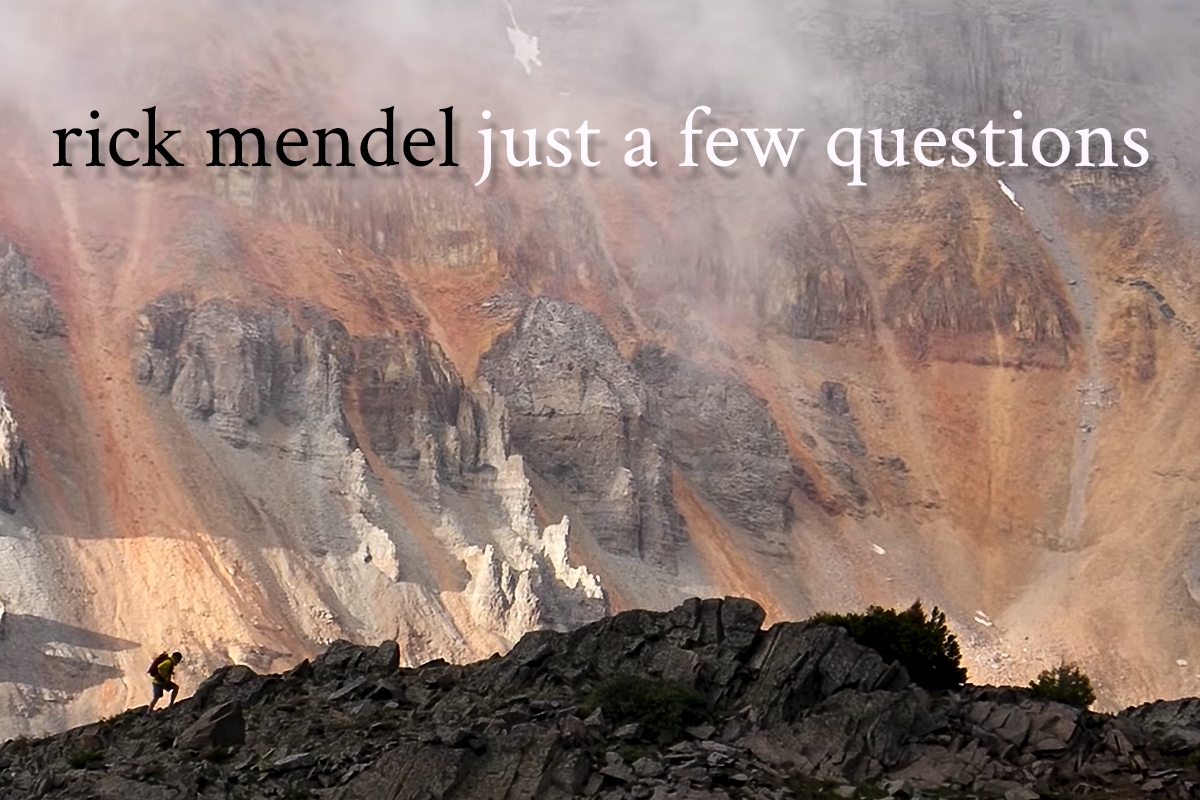Just A Few Questions: an interview with Rick Mendel
Fly Fishing Film Interview with 70-year-old Rick Mendel.
Get your phone out… jump on Instagram… look up “fly fishing”. You’re soon to see a bunch of gratuitous hero shots. You might even notice a few scantily-clad women in Brazilian bikinis holding a fish caught by someone else. If you’re new to the sport, there’s a good chance that you’d think fly fishing is an industry full of pretentious, top-notch anglers none of whom have ever been beginners or have done the doggy-paddle in the shallow end of the pool. Do you want the truth? I’ll answer that question for you: of course you want the truth. 1) We’re not all pretentious. 2) There’s much more time fishing… and lot less time catching and taking gratuitous hero photos. And, 3) Many of us sure as hell don’t look good in bikinis. The point is, there’s much more to the life of a fly angler. We wanted to tell one such story in our recent short film: Just A Number. It’s about a friend of Chasing Scale—a friend whom we admire and respect… a friend who’s story needed to be told. It’s merely a glimpse into the life of a man at a crucial stage in his life. In reality, it’s less about fly fishing and more about the human condition. And, the human condition is synonymous with change. With change comes challenge no matter what the sport. It just so happens that the sport of fly fishing can be integrated into our lives at just about any age, so long as you can cast a line. For Rick Mendel, that moment was 10 years ago. He is now 70. That’s where the “typical” side of this fly fishing story ends and the extraordinary part begins. We merely hinted at his story in the film. This interview is an attempt to learn a bit more about the man…
————————-
CS: “Now, you’re not from Telluride, Colorado. Most people that live in Telluride aren’t from Telluride. It’s the classic tale of the Colorado mountain town. I’m sure everyone’s got a unique story about how they got there. Can you share yours?”
Rick: “Some friends discovered Telluride in the mid 80’s. They returned to Key West and said “we’re selling everything and moving to Telluride, CO”. I had no idea what Telluride was like and en route to Seattle to visit friends I rented a car in Denver and drove down. That was in 1987. In 1990 I spent the month of January staying with friends while skiing and hiking in Telluride. There was almost no snow there at the time, so I spent more time hiking than skiing. That’s when I realized that I needed a change in altitude and would move to Colorado. In June of 1992 I packed up a U-Haul truck and headed west.”
CS: “What’s the fly fishing scene like in Telluride?”
Rick: “Telluride has a lot of people passionate who are all about fly fishing. Unfortunately, the river fishing here is currently not very rewarding. Our home river the San Miguel has, over the years, been degraded by heavy runoffs, poor management and over-fishing. I used to love to walk across the road and fish the Valley Floor. It was full of Brook Trout, some rainbows and the occasional nice Brown Trout. That’s no longer the case and you really can’t find anyone to talk to about the situation.”
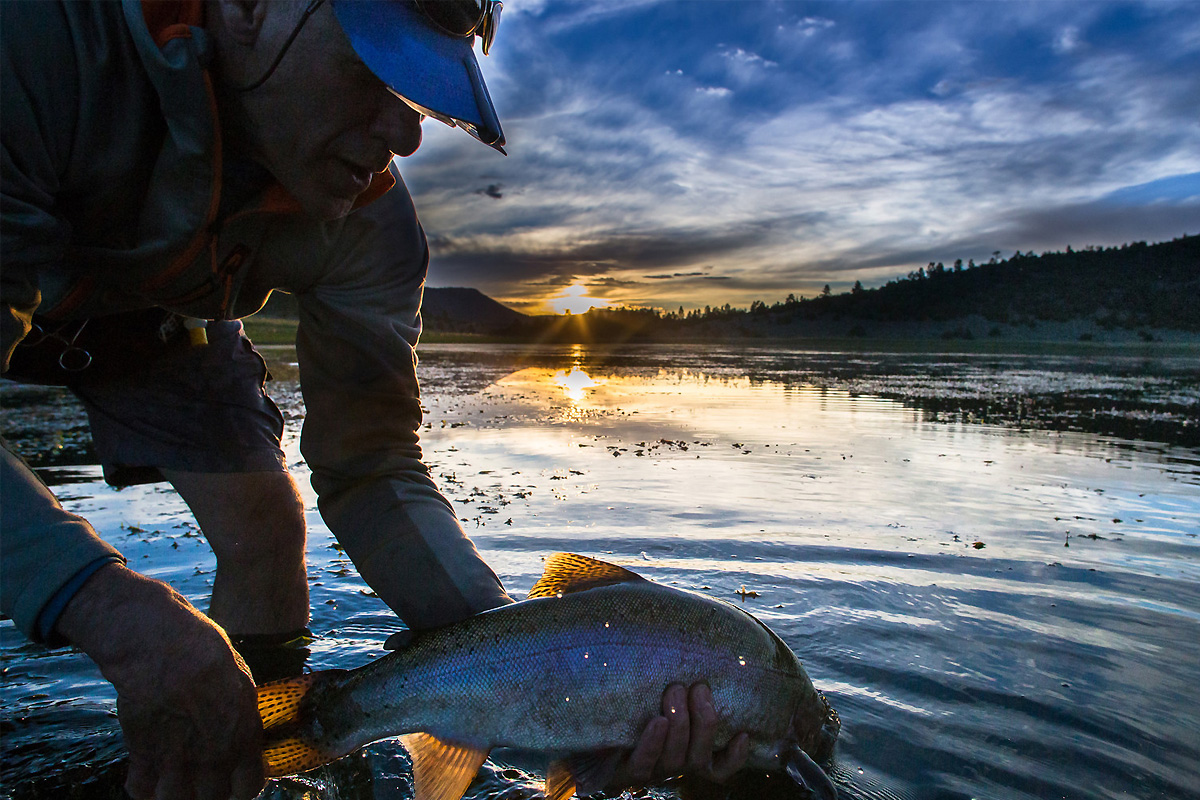
CS: “The recent Chasing Scale short film “Just a Number” gives us a mere glimpse into your life and left us intrigued. In the film you mentioned that you started fly fishing 10 years ago. Did you do any fishing prior to that? Take us through your decision to take on this challenging sport?”
Rick: “I started fishing because Ryan Bonneau goaded me into buying a fly fishing setup. He wouldn’t leave me alone until I bought a starter setup and started fishing with him. It wouldn’t be long before I found myself spending almost all my free time fishing–only occasionally with Ryan. Then he proposed a trip to Mexico to fish salt water. That’s when I pretty much became obsessed with fishing, because I had to start learning how to cast heavy flies and into the wind. After returning home from that first salt water trip, humiliated and discouraged by the difficulty and complexity of hunting salt water game fish, I was completely hooked on the sport.”
CS: “Getting up to those alpine lakes can be a daunting task. The hikes can be physically and mentally grueling. The weather can be unpredictable. What do you do to prepare yourself for an adventure up to the high country?”
Rick: “The most important thing one can do to prepare to hike to high mountain lakes is to get lots of miles on your legs. When I first moved to Telluride I was an avid trail runner. After I stopped running, due to foot injuries, I realized that I could become even more fit by fast hiking. Every summer I would spend my mornings and days off hiking and climbing peaks. I loved getting out and doing big, long hikes and later putting together loops that involved multiple peaks and finished the same day. Remember, I moved to Telluride when I was 44 years old, so I came late to the mountain game and had to really push myself to be able get the experience and knowledge of the area. I’m proud of my accomplishments in the mountains over the past 26 years. I’ve climbed nearly every named peak in the Telluride region at least once and many multiple times. I learned from a friend many years ago to go light and fast. Alpine starts are my method of choice and to cover as much terrain in one day as possible.”
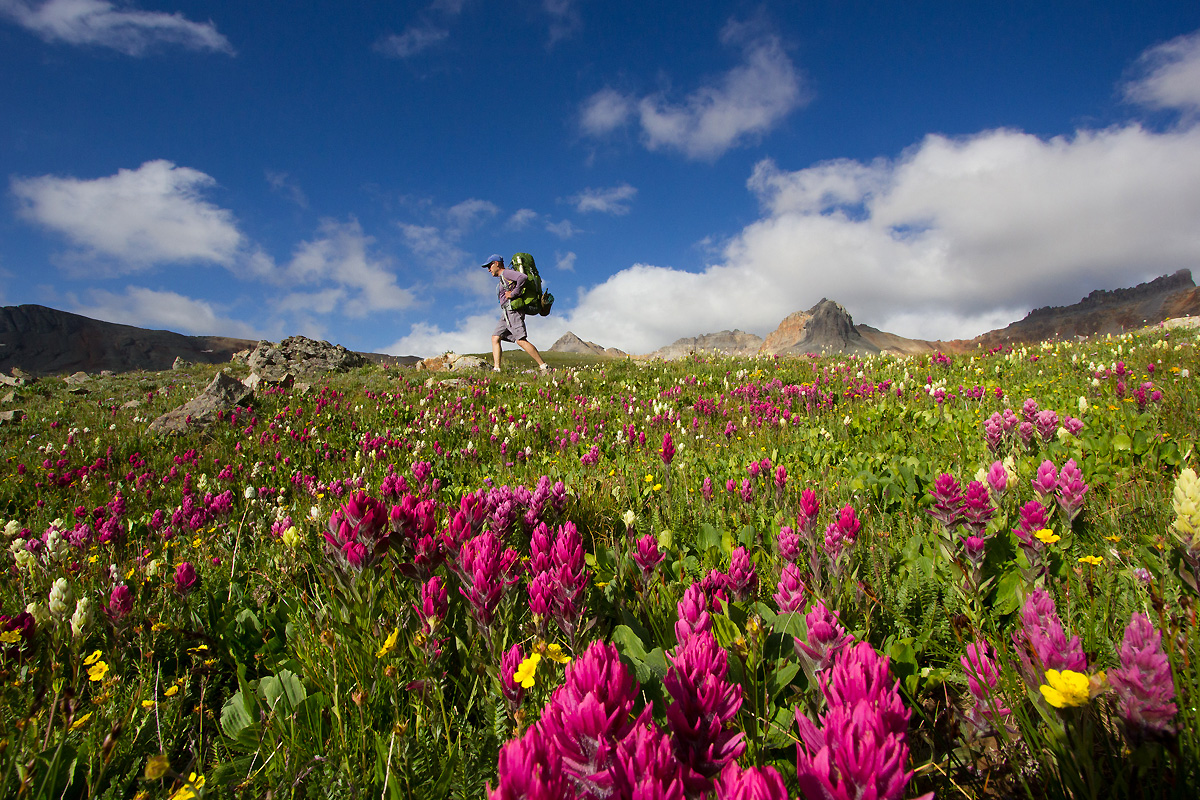
CS: “Those cutthroats must be pretty spooky up there in that gin clear water. What does it take to catch one of those beauties? Flies… leader… approach…?”
Rick: “Finding the right fly and going with the smallest leader and tippet that will get the job done are the most important keys to success. If the fish are cruising in a lake you can generally see them coming and prepare for your cast. Staying motionless when standing above the fish is also important. If you’re waving the rod around as the fish approaches you just watch the fish make a turn and head off in another direction.”
CS: “What’s the best time of year for fly fishing in those lakes?”
Rick: “Getting to the lakes as soon after ice-off as possible is the key. The fish are hungry and have somewhat forgotten what artificial flies are. The later in the summer the more difficult and challenging the fishing gets. But, don’t forget that the higher the lake the later the ice-off… and the later Spring arrives for those fish.”
CS: “How did those fish get up there?”
Rick: “All the lakes were stocked with resident fish. Some of the less accessible lakes were stocked many years ago and the fish have thrived. The higher the lake the shorter the growing and feeding season is for the fish. The highest lakes, those over 12,000 feet, have smaller fish just because the fish have less time to consume the summer time abundance of bug life. Lakes at the 11,000 foot range seem to be ideal in our area. The fish have a longer feeding season and the altitude means fewer anglers. A lake that is higher than most (but not too high) and more remote makes the difference between a twelve-inch-fish and an eighteen-inch-fish.”
CS: “Do you ever overnight in the alpine? What’s that like?”
Rick: “If a lake is farther away or more remote, backpacking is the best choice. It gives you more time at the lake to figure out the fish and bug life. As an added bonus, it also gives you more time to fish and enjoy the surroundings before the hike out.”
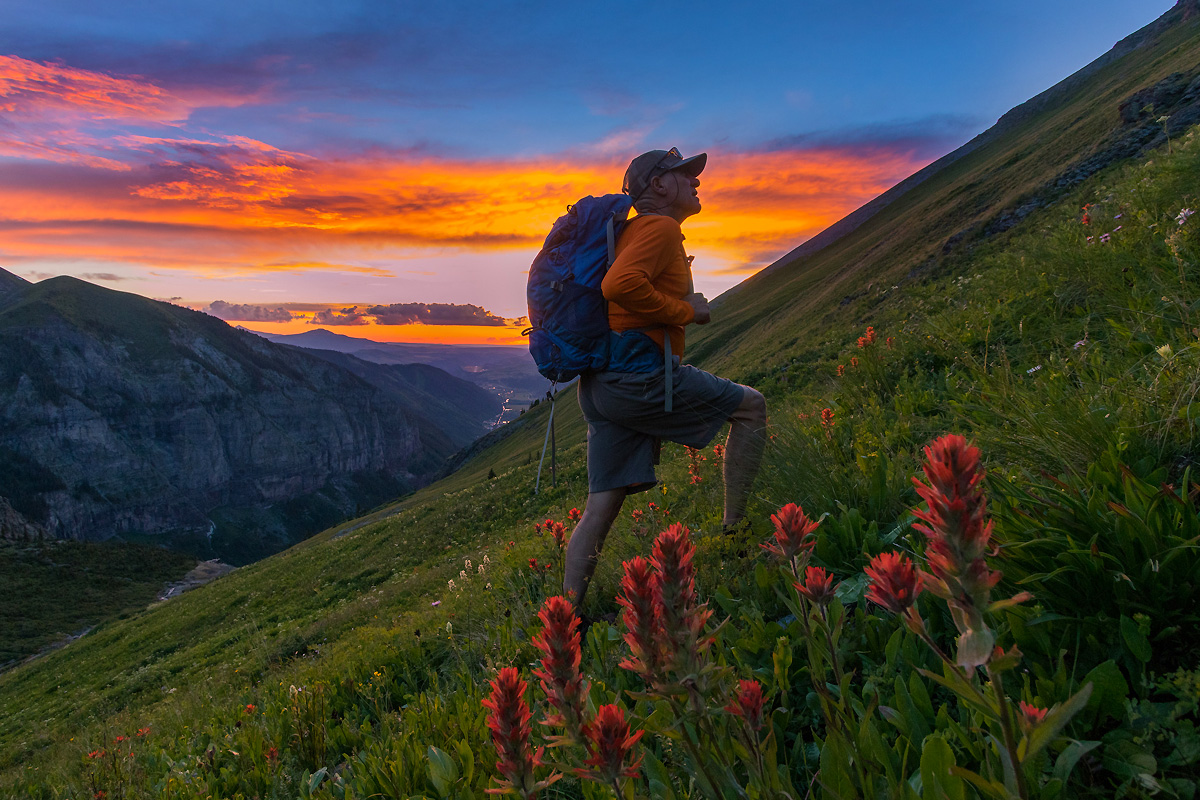
CS: “Other than the fish, have you had any memorable wildlife encounters?”
Rick: “If you spend a lot of time in the back country eventually you are going to run into wildlife. Over the years I have encountered elk, deer, bear, beaver, badgers, bobcats and otters. Not having a dog really helps. If you go into the back country with a dog the chances of encountering wildlife are reduced dramatically.”
CS: “Is there something beyond the fly fishing… beyond the beauty of the mountains… that draws you to those remote places?”
Rick: “Solitude, quiet, challenge and just being out there is a huge draw for me to get into the mountains.”
CS: “There must be dangers when it comes to high mountain hiking, especially when you’re older. Solo travel can add even more challenge and risk. What are some of the potential dangers and what do you do, personally, to help minimize them?”
Rick: “Being fit and using good judgement are, perhaps, the best tools for staying safe. Lightning is one of the biggest dangers in the mountains. Knowing how to read lightning and knowing when to get down off exposed areas will save your life. Too many people are struck by lightning and when you and your surroundings start buzzing get lower and into cover as fast as possible. Another good way to stay safe is to know your abilities and skills. Trust your instincts when in a dangerous situation. If you’re not comfortable doing something, then don’t do it. Remember, you can always come back another day and try again.”
CS: “At 70 years old, you seem very strong and healthy. To what do you attribute your physical condition?”
Rick: “Since my early thirties I have been very disciplined about my three rules of fitness: strength, flexibility and cardiovascular fitness. People ask me why I train and my reply is that I train for old age. I want to be able to do things in old age that I was doing when I was young and to be able to keep up with whomever I am out doing activities with. I’m definitely feeling like I’m slowing down a bit, but if I can do what I want to do and not suffer as a result, then I’m happy. I do yoga and strength training nearly every day. I try to get out and do fast hikes at least three times a week. I try to make it all fun, because if you’re not having fun you might as well go do something else.”
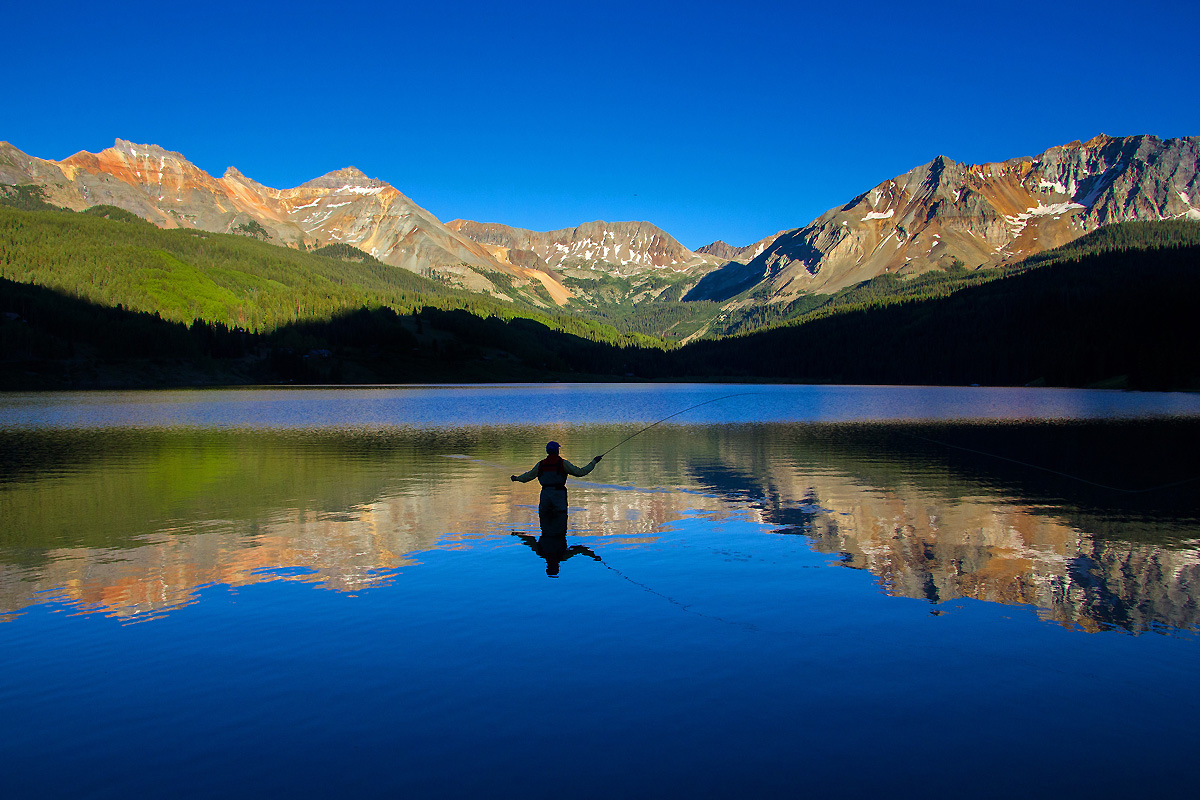
CS: “The film highlights your alpine exploits. Do you travel to other fisheries such as warm water lakes or salt water flats? What are some of your favorite destinations and why?”
Rick: “I enjoy researching new places to fish. I’m always on the lookout for new lakes and rivers to go fish. Now that I’m not working much, I can go fish in Utah and northern Colorado. My desire now is to fish the tropics. I don’t have to fish undiscovered places, I just want to expand my abilities and fish for species of fish that I have spent too little time pursuing.”
CS: “In the film you caught cutthroat trout. Do you pursue any other fish species? What are some of your other favorites and why?”
Rick: “Any fish can give me that electric thrill when it is hooked. Every fish is special in the catching and even more so when it is safely released to its waters. Bigger fish can really raise the level of excitement and anticipation of hopefully landing it. It’s pretty hard to put into words… that sensation of the take of the hook… and that initial reaction of the fish. I don’t think anyone has ever grown tired or indifferent to that. That’s the drug of the fisherman that keeps him addicted to the sport.”
CS: “Any words of advice to budding fly anglers who see themselves doing this into their 70s?”
Rick: “To anyone in the sport it’s important to have a good foundation of casting skills and knowing the knots. The fly fisherman is self motivated by the pure pleasure of the sport and the excitement it provides. The promise of new waters and environments will keep the angler always searching for the next place to wet the line and be challenged by the fish.
Lefty Kreh was still fishing into his eighties and Yvon Chouinard, the founder of Patagonia, is still actively fishing in his late seventies. The most important thing is to enjoy what you’re doing and have fun.”
————————-
Thank you to Rick for taking the time out of your busy, retirement schedule to do this interview. For the reader, I’ll leave you with these little tidbits: Rick just finished a week-long float trip down Montana’s Smith River. He’s pursued big stripers by kayak on Utah’s Lake Powell. He’s done multi-day trips in remote salt water flats in Mexico and Central America chasing bonefish and baby tarpon. He’s always been toe-to-toe with us youngsters! Rick: you inspire us to reach summits no matter what age.
Essay by Brock Munson
Photos by Ryan Bonneau
cofounders • Chasing Scale
Brock is the lead writer at Chasing Scale • brockmunson.com
Ryan Bonneau is the lead photographer at Chasing Scale • ryanbonneauphoto.com

